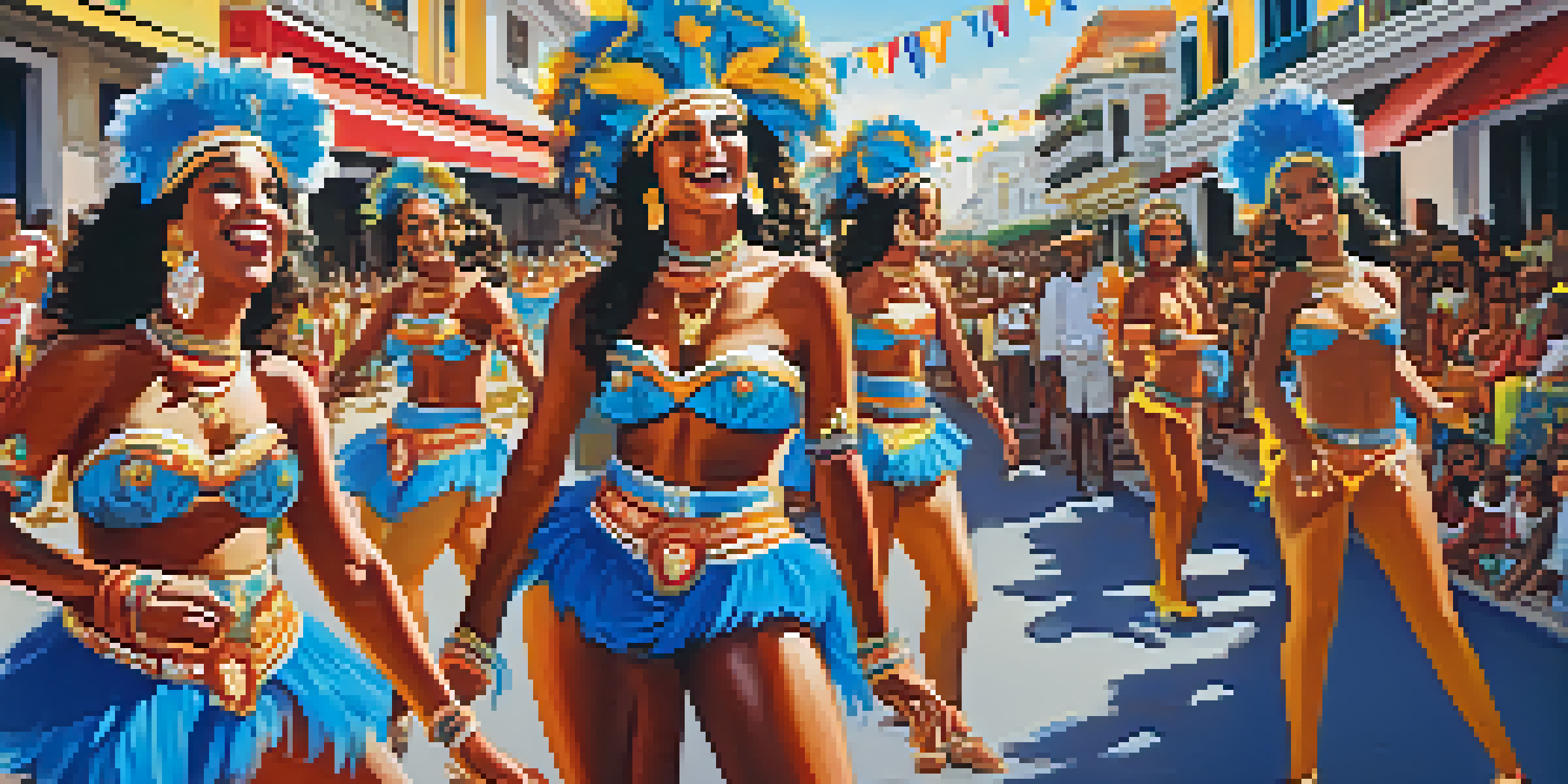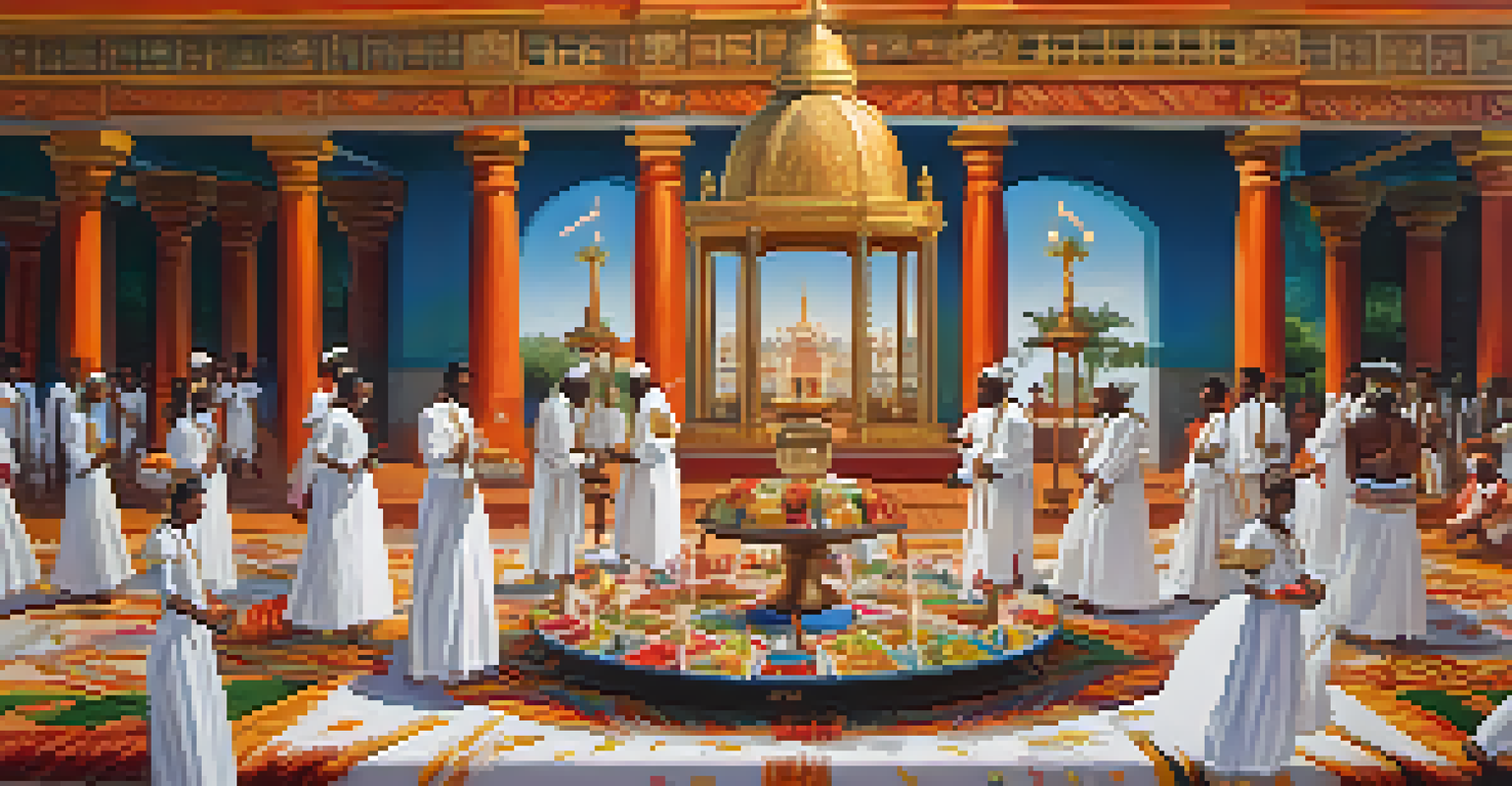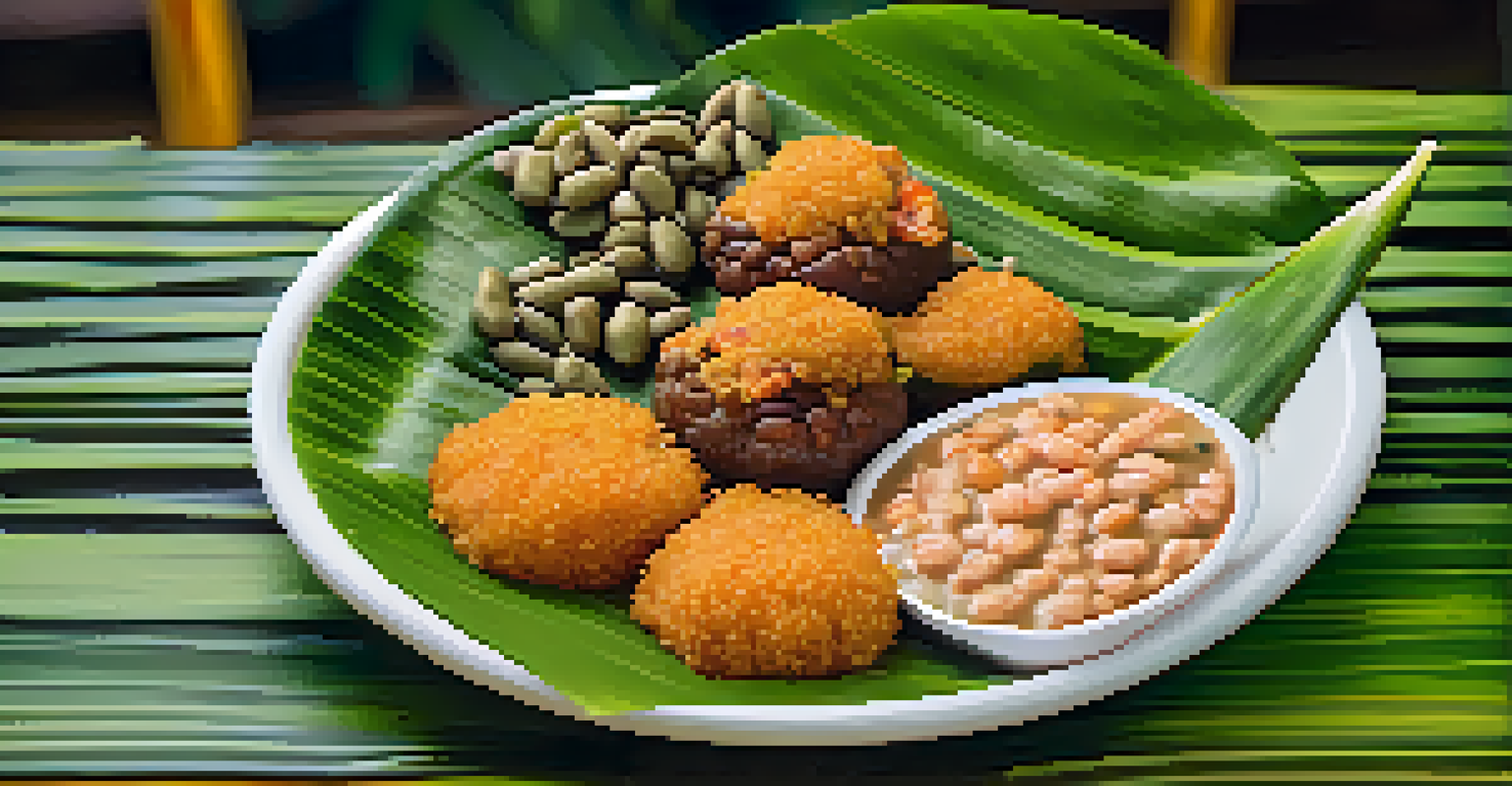The Afro-Brazilian Heritage of Bahia: Music, Dance, and Food

The Roots of Afro-Brazilian Culture in Bahia
Bahia, a state in northeastern Brazil, is a melting pot of cultures, primarily shaped by its rich African heritage. The history of the African diaspora in Brazil began with the transatlantic slave trade, which brought millions of Africans to this region. Their customs, languages, and spiritual beliefs have profoundly influenced Bahia’s identity, making it a key site for Afro-Brazilian culture.
Culture is the widening of the mind and of the spirit.
The blending of African traditions with indigenous and Portuguese elements has created a unique cultural tapestry. This amalgamation is evident in the local languages, rituals, and social practices that continue to thrive today. Bahia stands as a testament to resilience and cultural pride, showcasing how heritage can evolve while retaining its essence.
This cultural richness is particularly celebrated in Salvador, the state capital, where many Afro-Brazilian traditions are preserved and promoted. Festivals, parades, and community gatherings attract locals and tourists alike, offering a vibrant glimpse into the soul of Bahia and its enduring African influence.
The Rhythm of Bahia: Music and Dance Traditions
Music and dance are integral to Bahia’s Afro-Brazilian heritage, with genres like samba, axé, and capoeira taking center stage. Samba, with its lively beats and rhythmic movements, often fills the streets during Carnival, showcasing the community's joy and creativity. Each dance tells a story, connecting people to their roots and to one another.

Capoeira, a martial art that combines elements of dance, acrobatics, and music, is another unique cultural expression found in Bahia. Developed by enslaved Africans as a means of self-defense and cultural expression, capoeira blends rhythm and movement in a captivating way. Practitioners, known as capoeiristas, perform in circles, creating an electric atmosphere that draws spectators into the action.
Cultural Fusion in Bahia
Bahia's rich African heritage blends with indigenous and Portuguese influences, creating a vibrant cultural identity.
Music, often accompanied by traditional instruments like the berimbau and atabaque, serves as a means of storytelling and cultural preservation. Whether it's through the powerful lyrics of a samba song or the interactive nature of capoeira, these art forms foster community and invite participation, making the celebration of Afro-Brazilian culture a shared experience.
Culinary Delights: The Flavors of Afro-Brazilian Cuisine
Bahia’s culinary scene is a delicious reflection of its Afro-Brazilian heritage, characterized by rich flavors, spices, and unique ingredients. Dishes like acarajé, a fried ball made from black-eyed peas and filled with shrimp, showcase the influence of African cooking traditions. This dish is not only a favorite street food but also a symbol of cultural identity.
We do not inherit the earth from our ancestors; we borrow it from our children.
Moqueca, a traditional fish stew prepared with coconut milk, peppers, and palm oil, highlights the fusion of African, Indigenous, and Portuguese cooking techniques. The use of fresh ingredients and bold flavors in these dishes tells a story of the region's history and its connection to the sea and land. Sharing a meal becomes an act of cultural celebration, bringing families and communities together.
Food in Bahia is deeply intertwined with rituals and spirituality, often featuring prominently in religious celebrations like Candomblé. This Afro-Brazilian religion honors African deities and ancestors through offerings and communal meals, reinforcing the connection between culture, spirituality, and gastronomy in this vibrant region.
Candomblé: Spirituality and Community in Bahia
Candomblé, an Afro-Brazilian religion rooted in African traditions, plays a significant role in Bahia's cultural landscape. This faith, which honors a pantheon of African deities known as Orixás, is a vibrant expression of spirituality that blends African beliefs with elements of Catholicism. Rituals often include music, dance, and offerings, creating a communal atmosphere that fosters unity and shared identity.
The religion is not only a spiritual practice but also a source of cultural pride for many Bahian residents. Candomblé houses, or terreiros, serve as community centers where people gather to celebrate their heritage, learn about their history, and connect with their ancestors. These spaces are vital for preserving traditions and passing down knowledge to younger generations.
Celebrating Through Festivals
Festivals like Carnival and the Festival of Iemanjá showcase Bahia's Afro-Brazilian heritage, uniting communities in celebration.
Candomblé also contributes to Bahia's artistic expressions, influencing music, dance, and visual arts. The colorful garments worn during ceremonies, the rhythmic drumming, and the intricate dances all reflect the deep cultural significance of this spiritual practice, making it an essential part of Bahia's Afro-Brazilian identity.
The Impact of Afro-Brazilian Heritage on Bahia's Festivals
Festivals in Bahia are a vibrant celebration of Afro-Brazilian heritage, attracting visitors from around the globe. Events like the Festival of Iemanjá, dedicated to the goddess of the sea, showcase elaborate offerings and lively music, creating a spectacle that embodies Bahia's cultural richness. These festivals not only celebrate tradition but also strengthen community bonds and cultural pride.
Carnival in Bahia is another highlight, where music, dance, and costumes come together in a dazzling display of creativity and joy. The streets come alive with samba parades and blocos that illustrate the region's diverse Afro-Brazilian influences. Carnival serves as a powerful reminder of the resilience of Afro-Brazilian culture, highlighting its ability to thrive despite historical challenges.
Through these festivals, Bahia’s residents and visitors alike experience the lively spirit of Afro-Brazilian culture. They offer a platform for artistic expression, cultural exchange, and communal celebration, reinforcing the importance of preserving and honoring this heritage for future generations.
Art and Craftsmanship: Expressions of Bahia’s Heritage
The artistic landscape of Bahia is filled with vibrant expressions that reflect its Afro-Brazilian heritage. From traditional crafts like beadwork and pottery to contemporary art, local artisans draw inspiration from their cultural roots. These art forms not only beautify the community but also serve as a means of storytelling and cultural preservation.
The use of bright colors and intricate patterns in Bahian art often symbolizes deeper meanings related to African spirituality and history. For instance, the use of specific colors may represent different Orixás, weaving spirituality into everyday life. Visiting local markets or galleries allows one to appreciate the skill and creativity of Bahian artists while connecting with their cultural narratives.
Art as a Cultural Expression
The artistic landscape of Bahia reflects its Afro-Brazilian roots, with crafts and performances serving as vital storytelling tools.
Art in Bahia extends beyond visual expressions; it embodies the rhythms and stories of the Afro-Brazilian experience. From street art to performance art, these creative outlets foster a sense of cultural identity and pride, inviting both locals and tourists to engage with Bahia's rich heritage in meaningful ways.
Preserving Bahia's Afro-Brazilian Heritage for Future Generations
As Bahia continues to celebrate its Afro-Brazilian heritage, preserving this rich culture for future generations becomes increasingly important. Educational programs, community initiatives, and cultural organizations work tirelessly to maintain traditions and promote awareness of Afro-Brazilian history. These efforts ensure that the stories, music, dance, and culinary traditions are not lost in time.
In recent years, there has been a growing appreciation for Afro-Brazilian culture among younger generations. Initiatives that encourage participation in traditional practices, such as capoeira and Candomblé, help foster a sense of belonging and pride. This cultural revival not only strengthens community ties but also empowers individuals to embrace their heritage.

The preservation of Bahia's Afro-Brazilian culture is a collective effort that requires the involvement of all community members. By celebrating and honoring their roots, Bahian residents can continue to inspire future generations, ensuring that the vibrant tapestry of their heritage remains alive and thriving.